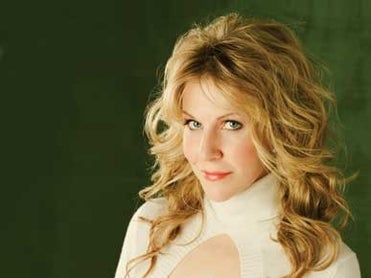Joyce DiDonato/David Zobel, Wigmore Hall, London

Your support helps us to tell the story
From reproductive rights to climate change to Big Tech, The Independent is on the ground when the story is developing. Whether it's investigating the financials of Elon Musk's pro-Trump PAC or producing our latest documentary, 'The A Word', which shines a light on the American women fighting for reproductive rights, we know how important it is to parse out the facts from the messaging.
At such a critical moment in US history, we need reporters on the ground. Your donation allows us to keep sending journalists to speak to both sides of the story.
The Independent is trusted by Americans across the entire political spectrum. And unlike many other quality news outlets, we choose not to lock Americans out of our reporting and analysis with paywalls. We believe quality journalism should be available to everyone, paid for by those who can afford it.
Your support makes all the difference.Joyce DiDonato is not just a singer, she's a cheerleader carrying the torch for opera whenever she gets the chance.
On stage and in recital she’s Protean: she can do spitting fury in Handel, comedy in Donizetti, and when singing an aria designed for a castrato she can divest herself of all trace of femininity: the only constant is her perfect, golden tone. No wonder the Wigmore is having to put on a repeat of this recital, to cope with the demand.
On she came, a blonde Kansas bombshell in a scarlet ball-dress with a scheme of an unusual sort: she was going to resuscitate a programme she had recorded at the Wigmore six years ago - piles of surplus-stock Cds sat hopefully on sale at £6 in the foyer - devoted to songs inspired by Venice.
First up were two uncharacteristically unassuming ones by Vivaldi, in which we could savour her effortless coloratura and her ability to bring a lovely note seemingly out of nowhere. Then came five settings of Verlaine poems by Gabriel Faure, delivered with wonderful lightness and in velvet tones as DiDonato and her pianist David Zobel demonstrated their musical symbiosis. Rossini’s ‘La regata Veneziana’, which followed, became a bewitchingly comic turn (a shame the Radio 3 listeners won’t see her), but the next section of the show fell flat: tying snatches of second-rate Schubert, Schumann, and the forgotten English composer Michael Head together under the ‘Venetian’ banner created an awkwardly factitious effect. But she went out in style with Reynaldo Hahn’s ‘Five songs from Venezia’, which had been improbably premiered by the composer himself (plus piano) on a gondola in 1901: here they had irresistible feline grace.
DiDonato’s first encore - more beautifully-nuanced Vivaldi - was a sneak preview of her next Cd entitled (really?) ‘Drama Queens’. Her second was a melange of Handel and Rossini in a concentrated and flawless blast of killer-coloratura.
Then we had to join her in ‘Happy Birthday’ for a Wigmore patron. I left after the third verse of the fourth encore - a sweetly un-ironic ‘Somewhere over the rainbow’, by which time the audience had become this drama-queen’s slaves-for-life. Result!
A brilliantly successful first date, with going-steady the next step, and a wedding – or as the Wigmore would say, a residency – just round the corner.
Join our commenting forum
Join thought-provoking conversations, follow other Independent readers and see their replies
Comments